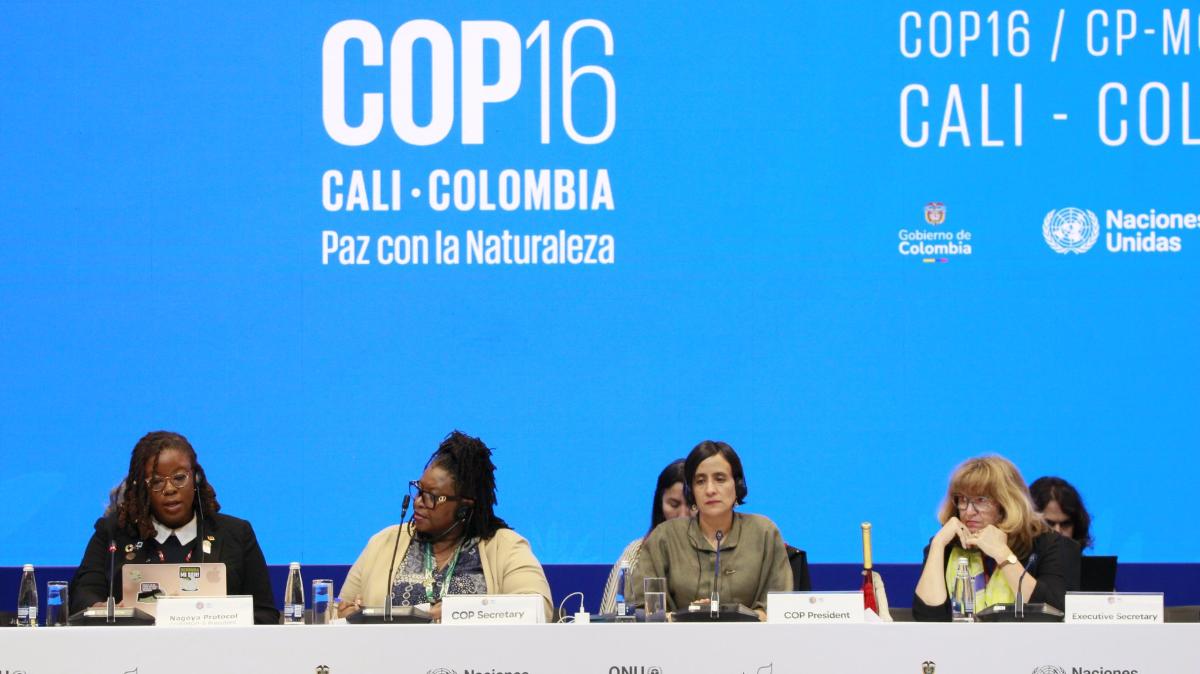UN Biodiversity Conference reached agreement on genetic resources fund – other major issues remained unresolved

UN Biodiversity Conference COP16 ended with a skinny agreement on Saturday morning after having gone into overtime. A benefit-sharing mechanism for digital information on genetic resources (the Cali Fund) was established and the role of indigenous peoples was strengthened, but no understanding was reached on monitoring the implementation of biodiversity targets or mobilising finances. As the meeting dragged on and some of the negotiators had to go home, there was no quorum to make decisions.
“The genetic resources fund is a new financing mechanisms worth billions outside the taxpayers’ pockets, which is a historical achievement. Yet, the outcome was a disappointment as the rules for the implementation of the biodiversity target played a secondary role. Our target to agree on strong rules for the implementation was not reached,” Minister of Climate and the Environment Kai Mykkänen says.
The objective of Finland and the EU was to establish comprehensive rules for how the countries monitor their biodiversity actions and report on these. In Cali the implementation rules became a hostage to the discussions on finances as developing countries wanted to set up a new fund directly under the Conference of the Parties, even if the Global Biodiversity Fund under the Global Environment Fund (GEF) was launched just a little over a year ago. In the end, both the monitoring and financing issues remained completely unresolved.
“Increasing the complexity of funding would not bring more money and we must keep the management of funds in control as we are dealing with taxpayers’ money. All stand to lose if we only focus on creating new funds instead of impact and channelling the financing. It is a pity that we did not reach an agreement, but we could not compromise any more on this,” Mykkänen says.
Payers also benefit from digital sequence information
Those making payments to the Cali Fund established at the Conference are those benefitting commercially from digital sequence information on genetic resources (DSI), such as pharmaceutical companies and the cosmetics and chemical industries. In future, these will pledge one percent of their profits or 0.1 percent of their turnover to the fund.
The potential for accumulating biodiversity financing through is mechanisms is considerable - experts say that it may amount to billions. Of course, I am very happy that with this fund the private sector will be more strongly involved in financing biodiversity actions,” Minister Mykkänen says.
Conference boosted national strategies and financing pledges
Despite the skinny agreement, some of the news from COP16 were positive and the Conference accelerated the processes to submit the national targets and strategies and make financing pledges. By Saturday, 119 countries had reported their national targets and 44 countries had updated their national strategies. During the Conference, EUR 163 million in financing pledges were made to the Global Biodiversity Fund. Among the new pledgers was Quebec, which for the first time expanded the group of contributors to sub-national entities.
Role of Sámi and other indigenous peoples strengthened
The role of the Sámi and other indigenous peoples in the implementation of the CBD will become stronger as the Conference decided to set up a new permanent body for indigenous peoples. A negotiation outcome was reached on the link between biodiversity loss and climate change. COP16 approved the Global Action Plan on Biodiversity and Health and made a decision on mainstreaming biodiversity and its sustainable use to different sectors. Finland and 16 other countries also set up a “mainstreaming champions” group that will share information and gather experiences on how biodiversity issues can be addressed in a cross-cutting manner.
“I believe that this will support the extensive implementation of the future national strategy and action plan. In Finland we already have good examples of how many sectors have introduced biodiversity roadmaps for their operations,” Finland’s Chief Negotiator Marina von Weissenberg says.
Outside the actual negotiations, the Conference inspired a record number of companies, financiers, NGOs and other stakeholders to share experiences and showcase their biodiversity work. The total number of participants was about 20,000 and especially the number of private sector representatives increased considerably, including in the Finnish delegation. Finland also signed the Declaration of the World Coalition for Peace with Nature, which highlights the connection between peace and biodiversity.
Inquiries
Lyydia Ylönen
Special Adviser to Minister of Climate and the Environment Kai Mykkänen
tel. +358 50 476 1341
Marina von Weissenberg
Chief Negotiator of CBD
tel. +358 50 307 0806
Joona Lehtomäki
Senior Specialist
National biodiversity strategies
tel. +358 50 598 6162
Riikka Lamminmäki
Head of Communications
tel. +358 50 576 2604
Requests for interviews with the Minister and negotiators